
PROJECT #2412
Skill Level:
Beginner
Time: 2 Days
Cost: $5
Plastic smartphone amplifiers can be had for about $15 a piece, but expect to fork out $100 or even more for a fancy handcrafted wooden one. They give a louder and richer sound than the phones by themselves. In a nutshell, they are just a box with a front opening and with a slot on the top to accept the phone. I made mine out of poplar and plywood scraps. In this article, I will show you a well-thought-out process that guides you through the making of a large batch of amplifiers in as few as two shop days. With literally everyone-young and old-owning a cell phone nowadays, these amplifiers could well be one of the most popular gifts you ever make.
1 The speaker can also do double-duty as a coaster.
Create the Design
Phone amplifiers can be made in all kinds of shapes and sizes, but a trumpet-shaped cavity will give the best amplifying results. I prefer a more compact design and the whole box measures 13/4" x 41/2" x 5". For a more stylish look, I designed the box to be in a speaker shape instead of a square or rectangle, as commonly seen. While primarily an amplifier, I also use it as a cup stand in the shop. You can add any other desirable features to your design, such as making it a charging station as well.
Given the angled shape of the amplifier, it would be quite a challenge to build it with any traditional joinery such as a dovetail or butt joint. My solution was simple and easy to execute: first, I laminated three pieces to form a rectangular box with a hollow chamfer (refer to page 31). Then, I cut the box into its final shape.
2 Align the left center point with the drill bit. Lock the stop block in place.
3 Drill the top and middle pieces together as a stack placed against the stop block.
Diese Geschichte stammt aus der August 2024 - Issue 279-Ausgabe von Popular Woodworking.
Starten Sie Ihre 7-tägige kostenlose Testversion von Magzter GOLD, um auf Tausende kuratierte Premium-Storys sowie über 8.000 Zeitschriften und Zeitungen zuzugreifen.
Bereits Abonnent ? Anmelden
Diese Geschichte stammt aus der August 2024 - Issue 279-Ausgabe von Popular Woodworking.
Starten Sie Ihre 7-tägige kostenlose Testversion von Magzter GOLD, um auf Tausende kuratierte Premium-Storys sowie über 8.000 Zeitschriften und Zeitungen zuzugreifen.
Bereits Abonnent? Anmelden
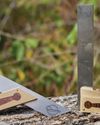
Ironbark Toolworks
Devon Campbell is designing and building world-class tools from his shop in Queensland.
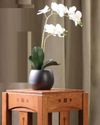
Fern Stand
This Charles Limbert table was sold as a fern stand, but it's a great addition to any home.
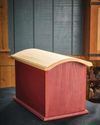
Norwegian Linen Chest
This small linen chest can be made in batches, and the lid presents some fun challenges during the process.

Bent Lamination Headphone Stand
Practice some mass-assembly techniques to create this elegant stand.

All About PPE
Safety is #1 in the workshop.
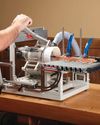
Joinery Machines
Joinery machines are much more than one-trick ponies. Here's an intro, and why you should consider adding one in your shop.
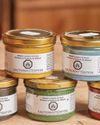
Linseed Paints
Linseed paint will change the way you approach painting a project, but this wonderful finish takes a different approach than modern paints.
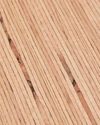
BauBuche
This laminated material comes from Germany, and is made of hundreds of layers of European beech.
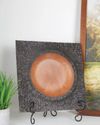
Square Platter with Textured Rim
Adding a bit of texture and colour to a square platter is a great way to dress up a simple design.
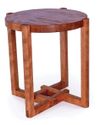
Excedo Side Table
With one board, you can put together this side table that packs in a bunch of great woodworking techniques.